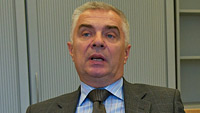Interview with Piotr Switalski, Head of the Directorate of Policy Planning
(2 November 2010)
 You have just been appointed Head of the new Directorate of Policy Planning; can you tell us why policy planning is important to us?
You have just been appointed Head of the new Directorate of Policy Planning; can you tell us why policy planning is important to us?
Policy planning is a way of reading the signs and predicting future trends, but the main point is to provide critical analysis, alternative thinking and rich ideas to help the Secretary General turn his vision of a new, relevant and dynamic Council of Europe into reality.
So much has changed in 20 years…and not just amongst the young. Once the only way to network, discuss and make decisions was by organising conferences: now we can skype and tweet. We can access information easily on websites and link with our community online. We are living longer and in better conditions. Where once the main motivation of most people was financial security, now it is about personal feelings of security and individual values. At the political level, the EU has expanded and countries such as Russia and Turkey have become hugely upwardly mobile in economic terms.
For us this means a shift in the way we work. Times are changing dramatically, and whilst we may have succeeded in meeting the problems of yesterday, we need to be sure we are fit to meet the problems of the future. That is why reform is essential, to make us organically suited to the challenges to come.
What links policy planning and the reform process?
The Council of Europe needs to be seen as politically relevant. It needs to be second nature that governments include our values and standards in their own policy planning processes. We have to give up the idea that we are working in an ivory tower.
Every part of our family, be it member states or staff, will now get the chance to reaffirm and own the Council of Europe’s strategic mission. We are already well known for a quality product. There is much to be proud of and the professional level and competence of staff is high. The reform will keep those core strengths, retaining what is good, and giving the Council the value it deserves by creating focus and purpose.
Tell us more about the Group of Eminent Persons? What is the idea behind this initiative and how will it fit in with the reform process?
This began as an initiative of the Turkish authorities and the Secretary General. The idea is to bring together a set of brilliant, experienced and creative minds to take a deeper look at where our society is now, against a backdrop of rising extremism and demagogy. There will be five meetings of the group before they present their findings in Istanbul in May 2011.The first meeting was very successful and augurs well for the future. I’m very optimistic that its dynamism and creativity will bring good results.
The group’s work will provide a framework for the reform. So far, there has been a tendency to see the reform as administrative or budgetary, but it is far deeper: it is not about fixing up “weaknesses” but about creating a new direction and fine-tuning the organisation to new realities.
How do you feel about the task ahead?
I have worked with many international organisations, and my experience is that it is easier to rebuild from scratch. But that is not what we want to do here. The idea is to build on the good and make it even better.
I have always said that the Council of Europe is a beautiful organisation because it is based on pioneering assumptions. Its role – as any international organisation – is not only to service governments but to service the ordinary people directly. Our values are not just political, geographical and economic; they are the values of human dignity and human freedom. This is important for everyone here: it really makes you feel as if you are serving something that is bigger than just the institution. A successful reform will result in a clearer vision and renewed inspiration for everyone here. That is why I find this work such as pleasure.